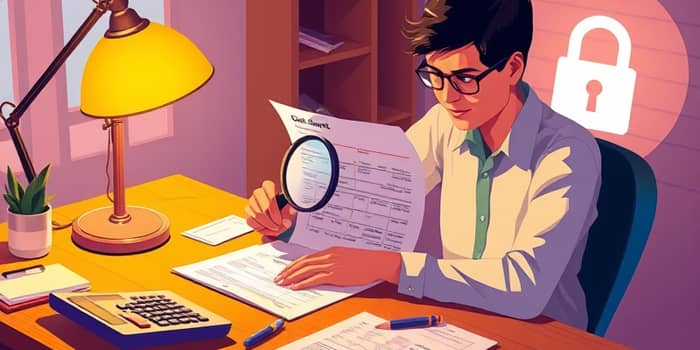
Staying on top of your financial transactions is essential in today’s digital age. A quick glance at a bank statement can reveal much more than just your balance. It is a crucial tool to maintain control over your financial well-being and to ward off potential threats. By developing a consistent habit of checking your statements, you can gain control over personal finances quickly.
Regularly scrutinizing your bank statements offers more than just peace of mind. It serves as an early warning system to identify suspicious activity that matters most. When you review your transactions on a weekly or monthly basis, you reduce the window of opportunity for fraudsters and minimize potential losses.
Early detection of unfamiliar charges can help you act swiftly. Prompt action not only limits your liability but also sends a clear signal to financial institutions and merchants that you are vigilant. Over time, this habit cultivates a deeper understanding of your spending patterns and empowers you to make informed financial decisions.
Unauthorized charges can arise from a variety of sources. Understanding their origins helps you stay one step ahead of potential threats.
Recognizing these sources allows you to trace and address irregularities effectively. Whether it’s a small recurring fee you never subscribed to or a large one-time withdrawal you didn’t authorize, knowing the common origins helps you pinpoint and resolve issues rapidly.
Catching unfamiliar charges early hinges on knowing what to look for. Some signs are obvious, while others may require a keener eye:
Alongside these direct signs, pay attention to alerts or notifications from your bank regarding unusual activity. These automated warnings often precede visible changes on your statement and can serve as an early cue to review your account in detail.
Implementing a systematic approach to statement analysis can transform a mundane chore into a powerful defense against fraud.
By breaking down statements into manageable tasks, you can maintain clarity and ensure accurate tracking of all monthly expenses. Incorporate digital tools and budgeting apps that allow for effortless categorization and alert generation when anomalies arise.
Prevention begins with robust security measures. Ensure your online banking uses strong, unique passwords and enable two-factor authentication wherever possible. Regularly update your credentials and avoid accessing your accounts over public Wi-Fi networks without secure VPN protection.
If you discover a charge that you did not authorize, contact your bank immediately. The sooner you report the issue, the faster the financial institution can investigate and reverse fraudulent transactions. You may also need to report the incident to credit bureaus and local authorities to safeguard your credit score and identity.
In particularly severe cases, consider placing a temporary freeze on your accounts or requesting new cards. This decisive action can halt further unauthorized access and give you time to reset your security measures.
Consumer protection laws in many jurisdictions require banks to resolve unauthorized charge disputes within a specific timeframe, often 30 to 60 days. Familiarize yourself with these regulations to hold your financial institution accountable for timely investigations.
Banks are also mandated to implement fraud detection systems and report suspicious activity to regulatory bodies. Understanding these legal frameworks gives you leverage when negotiating charge reversals or seeking restitution for losses.
Advancements in technology have revolutionized fraud detection. Automated systems analyze transaction patterns in real time, detecting anomalies that fall outside your routine behavior. These systems can:
minimize manual errors while flagging threats.
Machine learning algorithms grow smarter as they process more data, improving accuracy and reducing false positives. By opting into real-time alerts, you receive immediate warnings about potential threats, allowing you to act without delay.
Awareness is your first line of defense. Educate yourself about phishing tactics, common online scams, and the latest fraud schemes. Many financial institutions offer free seminars, webinars, or printed materials to help customers stay informed.
Additionally, reputable consumer advocacy groups and government agencies provide guides and checklists for safe banking. Keeping these resources within reach ensures you have support and reference points when uncertainty arises.
Consistent review of your bank statements is more than a financial habit—it’s a vital security measure. By understanding the importance of regular monitoring, recognizing common red flags, and employing both preventive and responsive strategies, you safeguard your assets and peace of mind.
Make statement reviews an integral part of your financial routine. In doing so, you build a resilient defense against unauthorized charges and take an active role in preserving your financial health.
References













